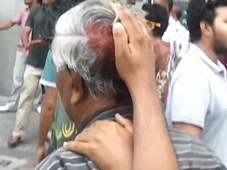Former Foreign Minister Dr Ahmed Shaheed has said allegations based around a 2010 Ministry of Foreign Affairs audit report claiming he illegally abused expenses are “politically motivated, misleading, ill-informed, and anachronistic.”
The audit report released this week alleged that a senior advisor to the Maldives mission to the UN in New York – hired under a two-year contract on August 30, 2010 when Dr Shaheed was Foreign Minister – left to work for Dr Shaheed in July 2011 upon his appointment as UN Special Rapporteur on Iran.
The report noted that such posts were neither part of the civil service nor considered political appointees, adding that the advisor was hired without a public announcement seeking qualified candidates.
Under the contract, the senior advisor was to receive US$2,672 a month as salary and allowances from September to December 2010 and US$3,672 a month from January 2011 onward.
However, on July 20, 2011, the Foreign Ministry sent a letter to the UN mission, the report noted, informing them that the advisor had been dismissed from the post as she would begin working for the Special Rapporteur on Iran “during the 6-month notice period”.
While approximately Rf800,000 (US$51,880) was spent out of the mission’s budget for salaries and benefits for the senior advisor, the report noted that “no information regarding the work could be seen from official documentation”.
“Misleading”
In an email to Minivan News, Dr Shaheed explained that the senior advisor was a foreign national who was an expert on international relations and diplomacy, slamming the audit report as “politically motivated and phrased to mislead the public.”
Shaheed claimed there would be “ample paper trail on the work she did for the Maldives from August 2010 to July 2011.”
“She was hired on the same basis as other expatriate advisors hired by the Maldives in diplomatic missions, and were political appointees,” he said, adding that the senior advisor resigned in July 2011 despite the audit report claiming the contract was terminated.
While the senior advisor began working for Dr Shaheed “pro bono” in August 2011, “this has nothing to do with the Maldives Mission. She or I have not benefited from any government facilities in our work,” Dr Shaheed insisted.
“It would have been normal for the Maldives government, having nominated me for the post of UN Special Rapporteur to assist me with my work, but this was not done,” he continued.
“If a letter was written by Minister Naseem to the Ambassador in New York to say that the Advisor who was sacked would be working for me, it would have been to indicate to the staff of the Mission that she was sacked immediately, rather than at the end of the 6-month notice period she was entitled to.
“Obviously, the Mission of Maldives in New York will have no record of any work done for me because she was not working in the premises of the Maldives mission, nor as its staff member.”
On the allegation that she was hired without a public announcement, Dr Shaheed said that she was “head hunted and had come in initially to run the campaign for the Human Rights Council which we won with flying colours in May 2010.”
“It as on this basis that she was hired in August, effectively in a bid to keep her from competitive offers of another diplomatic mission in New York. Advisors are not civil servants and are therefore political posts. A contract had to signed to meet with legal requirements of the United States,” he added.
On Rf235,001 (US$15,240) spent out of the office budget to pay the Foreign Minister’s mobile phone bill in 2010, despite parliament not having approved such an allowance for ministers, Dr Shaheed noted that the audit report referred to regulations passed by parliament on December 28, 2010, “two weeks after I resigned from office.”
“The old practice was for the government to pay the mobile phones of ministers,” he added.
Dr Shaheed served as foreign minister in former President Mohamed Nasheed’s administration from November 11, 2008 to December 12, 2010, when he resigned after not receiving parliament’s consent for his reappointment following the en masse cabinet resignation in July 2010.
Violations of public finance law
The Foreign Ministry’s 2010 audit report meanwhile highlighted 48 cases of alleged violations of the Public Finance Act and regulations under the law.
Among the issues raised in the report were discrepancies between the ministry’s financial statement and the Finance Ministry ledger; hiring of interns for the ministry and foreign missions without public announcements, including children and relatives of senior government officials; lack of details on Rf85.5 million (US$5.5 million) spent on foreign missions in 2010; incurring a fine of Rf28,862 (US$1,871) for unpaid utility bills; lack of “necessary internal controls” in accordance with public finance regulations on the ministry’s expenditures; and failure to properly maintain income records and stock inventories.
In April 2011, the report revealed, the Maldives embassy in China used approximately Rf600,000 (US$38,910) of free aid granted by the China Machinery Engineering Corporation (CMEC) to purchase a “Hyundai Santa Fe” vehicle with an additional Rf100,000 (US$6,485) from the embassy budget.
Moreover, in June 2011, the embassy in China sold a car registered to it without prior approval and has not deposited the proceeds from the sale to the state’s revenue account as of the report’s publication date.
The audit also discovered that the ministry spent in excess of the approved accommodation, travel and utility allowances for senior staff at foreign missions.
Furthermore, a total of Rf494,293 (US$32,055) was spent on mobile phone bills for senior staff at the ministry although it could not be determined whether all calls made from the 13 post-paid lines were for official purposes.
As some employees used roaming services on overseas trips, the report noted, phone bills reached over Rf30,000 (US$1,945) in some months.
“Therefore, [the Auditor General’s Office] believes that this is an opportunity to misuse state funds without any control,” the report stated.
Addressing the irregularities raised in the audit, Dr Shaheed meanwhile argued that “some of the assumptions and conclusions are clearly false.”
“The report also fails to note or establish lines of financial accountability, unfairly exposing civil servants and politicians to unwarranted and malicious attacks on their reputation and integrity,” he said. “However, the report does identify a number of systemic deficits that need to be addressed too, and which do not result from lack of integrity of the persons involved, and I am happy that a number of those matters have been highlighted.”
Likes (0)Dislikes
(0)Dislikes (0)
(0) 
